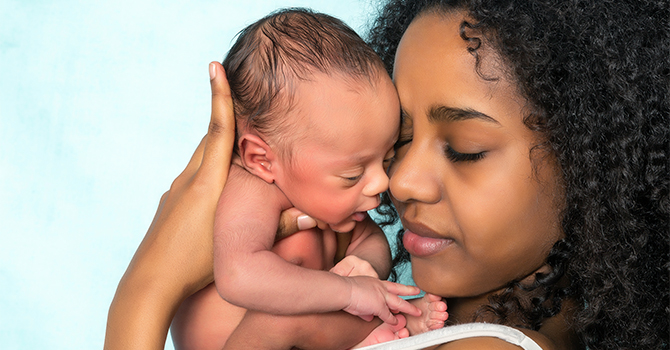Recognizing Black Maternal Health Week

Avonlea Rickerson
MPH ‘20, Health Behavior and Health Education
Maternal and infant mortality are intricately linked and are widely considered to be an indication of a nation's overall health, and the United States' rates are relatively higher than those in more disadvantaged countries. Black pregnant people are 3-4 times more likely to die from a pregnancy-related complications than white birthing people, irrespective of educational attainment. Black pregnant people are also more likely to experience conditions such as preeclampsia, postpartum hemorrhage, blood clots, and increased incidence of other pregnancy-related complications. Their infants also face up to double the risk of dying.
The United States has an infant mortality rate of 5.6 per 1000 live births in 2022, with a health disparity among Black babies at a rate of 10.6 deaths per 1,000 live births in 2021, double the national average. According to the Centers for Disease Control and Prevention, approximately 700 birthing people die each year in the United States because of pregnancy or delivery complications. This is a maternal health crisis and has multiple causes, including systemic inequities, unconscious bias, access to care and social determinants of health contributing to the horrific statistic.
This trend of not taking Black pregnant seriously has resulted in maternal mortality and morbidity. After giving birth, world tennis champion Serena Williams began to lose feeling in her legs and her pain increased. In this 2022 Elle magazine article, Williams recounts how she had to beg the nursing staff to run a test. When her doctor finally agreed, the tests revealed that immediate surgery was necessary to keep the clots from reaching her lungs. This example demonstrates that even the wealthiest Black pregnant people cannot escape the effects of structural racism.
Black Maternal Health Week (#BMHW) is a national week of action that aims to raise awareness around racial inequities in maternal health outcomes in the United States. Founded and led by the Black Mamas Matter Alliance to build awareness, activism, and community-building to amplify the voices, perspectives and lived experiences of Black Mamas and birthing people, this week is intentionally held during National Minority Health Month. In 2021, the Biden-Harris administration officially recognized Black Maternal Health Week, which takes place annually from April 11 to 17.
This year’s theme is “Our Bodies STILL Belong to Us: Reproductive Justice NOW!” Widespread restrictions on abortion care access coupled with rising cases of criminalization due to pregnancy loss continue to widen the gaps of adverse maternal and birth outcomes in the United States. Now that we are living in a post-Roe world, abortion access is becoming more restricted, and Black pregnant people suffer the most. Black pregnant people are more likely to live in areas where it’s harder to access contraception. They get abortions at the highest rates compared to birthing people of other races, due to high rates of unintended pregnancy. The continued implementation of restrictions on abortions in more conservative states will trap Black birthing people in cycles of poverty. The consequences will be deadly. Black pregnant people already have the highest rates of maternal mortality and pregnancy complications, and those risks will only increase if more Black pregnant people carry unwanted pregnancies to term.
About the Author
 Avonlea Rickerson is the administrative specialist for the Region 9 Perinatal Quality Collaborative. She received her Master of Public Health degree from the University of Michigan School of Public Health in 2020 and her bachelor’s degree from Howard University in 2017. She has worked
in various maternal/child health roles throughout Southeast Michigan including Henry
Ford Health and Black Mothers’ Breastfeeding Association. She pursued public health
to encourage and empower women/birthing people to be more knowledgeable and proactive
in their choices in pursuit of health. She strongly believes that through collaboration
we can achieve equitable health outcomes for all. She is eager to be a proactive resource
for birthing people and their families, and strives to advance maternal care for all.
For fun, Avonlea enjoys traveling across the world with her loved ones, trying and
cooking new foods, and going to the gym.
Avonlea Rickerson is the administrative specialist for the Region 9 Perinatal Quality Collaborative. She received her Master of Public Health degree from the University of Michigan School of Public Health in 2020 and her bachelor’s degree from Howard University in 2017. She has worked
in various maternal/child health roles throughout Southeast Michigan including Henry
Ford Health and Black Mothers’ Breastfeeding Association. She pursued public health
to encourage and empower women/birthing people to be more knowledgeable and proactive
in their choices in pursuit of health. She strongly believes that through collaboration
we can achieve equitable health outcomes for all. She is eager to be a proactive resource
for birthing people and their families, and strives to advance maternal care for all.
For fun, Avonlea enjoys traveling across the world with her loved ones, trying and
cooking new foods, and going to the gym.
